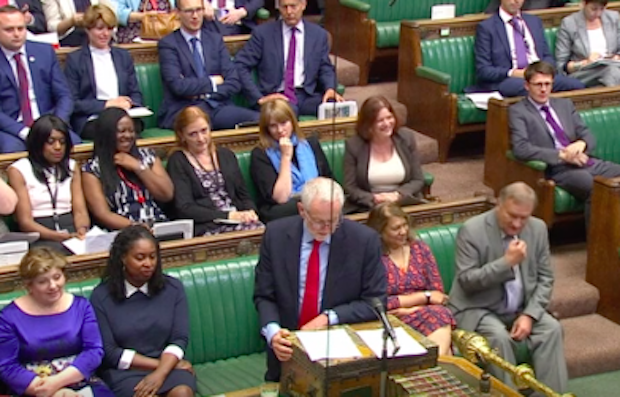After Theresa May received a hostile response in Brussels, perhaps she was hoping for a more amiable reception today in the Chamber when she revealed more details of her pitch to EU nationals living in the UK. In a statement, the Prime Minister told MPs that hers was a fair and serious offer (confirming she remains opposed to European Court of Justice adjudicating on rights of EU nationals after Brexit) but went one step further – telling EU nationals: ‘we want you to stay’.
Alas, her words did little to appease Jeremy Corbyn. Boosted by rowdy opposition benches, he accused the government of treating EU nationals like bargaining chips. The Labour leader said May was after a destructive Brexit and claimed – to heckling from the Tory benches – that some Conservatives were now coming round to Labour’s Brexit position.
In turn, May pointed out the confusion surrounding Labour’s stance on Brexit:
‘He talks about no plan. I set out our plan in the Lancaster House speech and in the Article 50 letter and have continued to set out those objectives.
Whereas the Labour party has had seven plans on Brexit in the past nine months and we’ve got members of the Labour party front bench – the shadow home secretary, the shadow chief secretary, the shadow attorney general – who want to retain free movement. We’ve got 35 Labour MPs who want to retain membership of the single market. Neither of these as far as I’m aware were actually in the Labour party manifesto that people stood on at the last election.’
Now, it’s a bit rich of May to accuse Labour of not sticking to their election manifesto when the majority of hers is already in the dustbin. However, she does have a point when it comes to the contradictions in the Labour position. In the manifesto, the party tried to appease those on both sides of the EU debate by saying it would seek a deal with ‘a strong emphasis on retaining the benefits of the Single Market and the Customs Union’ while refraining from saying they would stay members of both (note: John McDonnell has said that Labour would leave the Single Market). Now, no-one would disagree that a deal that involved the benefits of both of these things, would be a good thing. The issue is that neither are things that allow a toe-in, toe-out approach.
If Labour were in government, the limits of their best of both worlds position – call it, ‘have your cake and eat it 2.0’ – would be quickly exposed in the negotiations. However, as the opposition, it’s the perfect position. While various divisions of the party have conflicting ideas on Brexit, they can all unite by pouring scorn on anything the Tories come back with by saying it’s not good enough and alluding to a Brexit deal that doesn’t exist. May is right to highlight the confusion in Labour’s approach, but she will need to work much harder if she is to successfully land a blow.







Comments